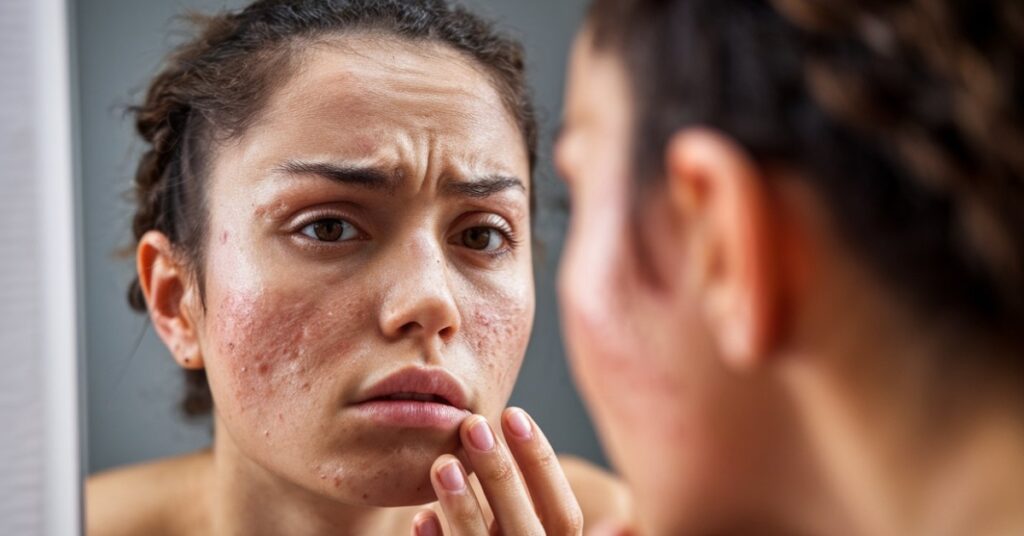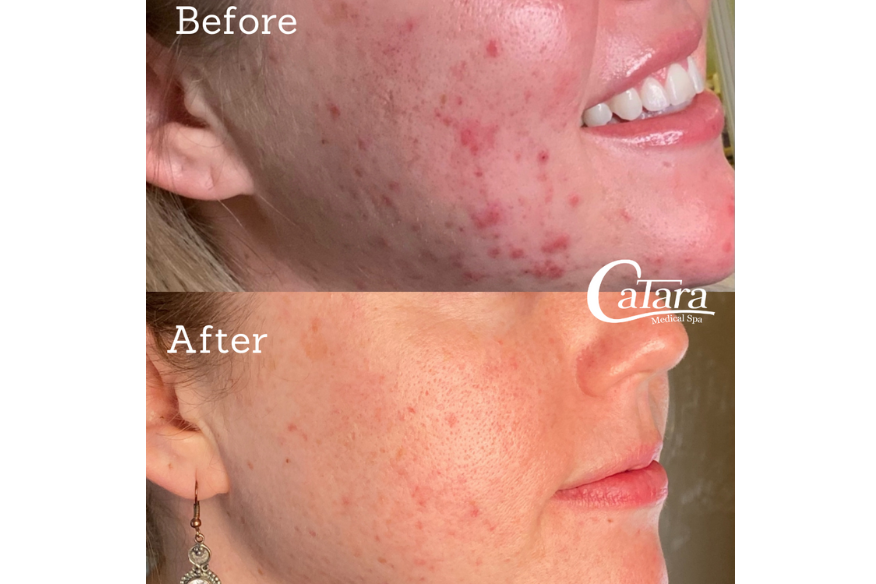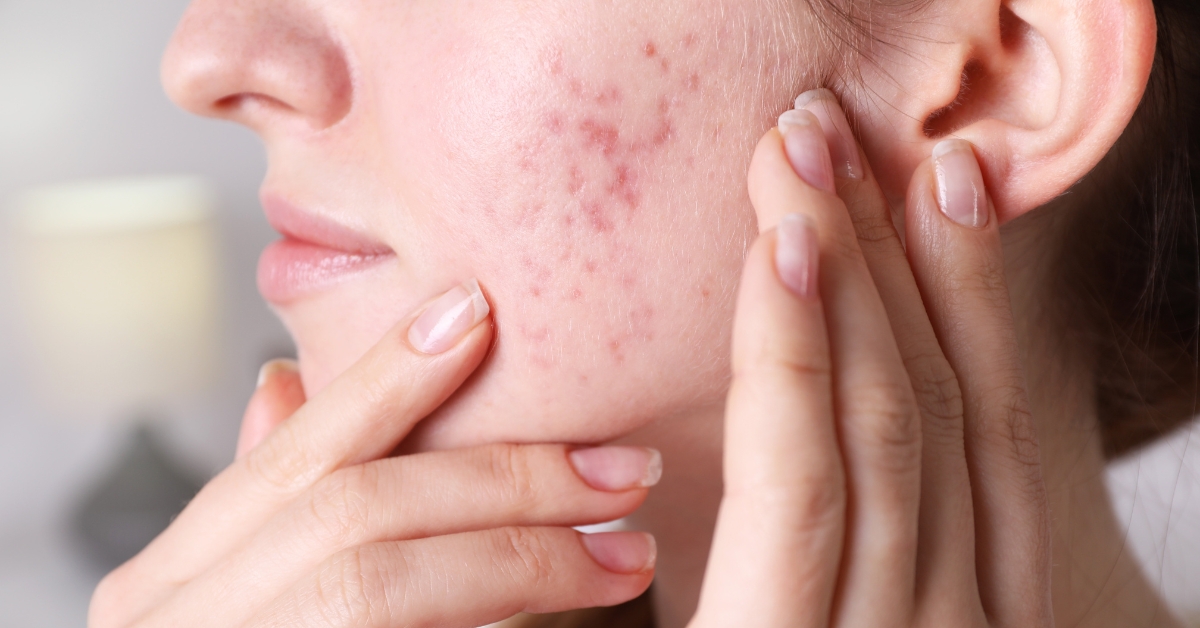When it comes to hyperpigmentation vs acne scars, the confusion is totally valid. They can look similar, but they come from different causes and need different treatments. If you treat hyperpigmentation like a scar, or vice versa, you might make it worse or waste time and money.
Let’s break it down clearly so you can confidently choose the right path to clear, even-toned skin.
What is the Difference Between Hyperpigmentation vs. Acne Scars
The primary difference between hyperpigmentation and acne scars lies in what causes them and how they affect your skin’s texture:
- Hyperpigmentation is a discoloration that shows up as a dark spot or patch where your skin produces more melanin (the pigment that gives your skin color) after inflammation or injury, like a pimple.
- Acne scars involve changes in skin texture. They can be indented (atrophic), raised (hypertrophic), or thickened due to how your skin heals deep damage caused by cystic or inflamed acne.
Key point: Hyperpigmentation is about color. Acne scars are about texture.
What Are Acne Scars?

Acne scars form when a breakout penetrates deep into the skin and damages the tissue. Your body tries to heal itself, but sometimes, it either produces too little collagen (leading to depressions) or too much (creating raised scars).
Types of acne scars include:
- Ice pick scars – small, deep holes in the skin
- Boxcar scars – wide, shallow depressions with sharp edges
- Rolling scars – wavy skin texture
- Hypertrophic/Keloid scars – thick, raised areas of scar tissue
Expert tip from our skin specialists at Catara Spa: Acne scars usually result from severe or cystic acne, and treating them often requires in-office procedures like microneedling, RF treatments, or laser therapy.
What Is Post-Inflammatory Hyperpigmentation (PIH)?
Post-inflammatory hyperpigmentation (PIH) happens when your skin makes extra melanin after it’s been inflamed like from a pimple, bug bite, or scratch. It’s not technically a scar, and it’s more common in people with medium to darker skin tones.
PIH appears as:
- Flat dark spots (brown, black, or red)
- Smooth to the touch
- Usually fades over time, but slowly
How to Get Rid of Acne Scars

Getting rid of acne scars usually takes a multi-treatment plan—and patience. Since these are deep changes in your skin’s texture, topical creams aren’t usually enough on their own.
Professional treatments that work:
- Microneedling
Creates tiny injuries to trigger collagen remodeling. Great for indented scars. - Chemical Peels
Promotes skin turnover to soften shallow scars. - Laser Resurfacing
Targets scarred tissue and stimulates healing. Fractional lasers are common. - Subcision
A minor surgical technique that releases tethered scars from deeper skin. - RF Microneedling
Combines microneedling with radiofrequency heat to remodel skin structure.
At Catara Spa, we often recommend a combination of microneedling and RF technology for long-term acne scar improvement—especially for rolling or boxcar scars. Take the first step toward smoother skin with our Acne Clinic Treatment.
How to Get Rid of Hyperpigmentation
Since hyperpigmentation lives in the top layers of your skin, it’s easier to treat than true acne scars but it still takes the right strategy.
Top options for fading hyperpigmentation:
- Topical treatments
- Vitamin C: Brightens and reduces pigment production
- Niacinamide: Calms inflammation and lightens dark spots
- Retinoids: Speeds up cell turnover
- Azelaic acid: Great for sensitive skin
- Hydroquinone (short-term use): Strong pigment reducer
- Chemical Peels
Mild to medium peels exfoliate pigmented cells and reveal clearer skin. - Laser Treatments
IPL and pigment-targeting lasers work well on stubborn marks. - Microneedling with serums
Increases absorption of brightening ingredients.
Always wear broad-spectrum SPF sun exposure can make hyperpigmentation worse and reverse your progress.
What Causes Dark Marks After Acne?
Dark marks after acne are mostly due to inflammation. When a pimple forms, your skin responds with a healing process. If it gets too aggressive or prolonged, it sends excess melanin to the site leaving a mark.
Other factors:
- Picking or popping pimples
- Not using sunscreen
- Genetics (some people produce more melanin)
- Certain medications or products that irritate skin
Dermatologists agree: Don’t pick your acne. That’s the fastest path to long-term marks—both scars and hyperpigmentation.
How Can You Fade Dark Spots from Acne?

To fade dark spots fast and safely:
- Be consistent with brightening ingredients
- Exfoliate gently 1–2 times a week
- Use sunscreen daily (SPF 30+)
- Avoid skin irritants or overly harsh treatments
- Visit a licensed aesthetician or dermatologist for guidance
At Catara Spa, we often customize facial treatments with enzymes, peels, or infusion therapy to target stubborn discoloration safely for every skin type.
If you’re looking for simple, effective ways on how to remove acne scars, explore our complete guide for helpful tips.
Who Can Develop Hyperpigmentation?
Anyone can get hyperpigmentation, but it’s more common in people with medium to deep skin tones (Fitzpatrick Skin Types IV–VI) because their skin naturally produces more melanin.
Also at higher risk:
- People with hormonal imbalances (like melasma)
- Those on acne medications or retinoids
- People with frequent breakouts or skin trauma
What Causes Hyperpigmentation?
The main triggers include:
- Acne or any skin injury (cuts, burns, scrapes)
- Sun exposure
- Hormonal changes (pregnancy, birth control)
- Inflammation or irritation from harsh products
- Certain medications (e.g., antibiotics, chemo drugs)
Prevention starts with sun protection and gentle skincare—not stripping your skin barrier.
Does Hyperpigmentation Cause Any Symptoms?
Hyperpigmentation is not painful or itchy, and it doesn’t cause swelling or redness (unless there’s an underlying condition). The only symptom is visible: a dark spot or patch that makes your skin tone look uneven.
If you notice:
- Raised areas
- Changing borders
- Itchiness or bleeding
Treatments for Hyperpigmentation & Scars from Acne
Here’s a comparison chart to help understand your best options:
| Treatment | Best for Hyperpigmentation | Best for Acne Scars | Notes |
| Vitamin C serums | Yes | No | Use daily, wear SPF |
| Retinoids | Yes | Mild scars | Can irritate sensitive skin |
| Chemical peels | Yes | Shallow scars | Requires professional care |
| Microneedling | Yes | Yes | Great combo treatment |
| Laser therapy | Yes | Yes | Must be skin-type appropriate |
| RF Microneedling | Mild benefit | Excellent | Stimulates collagen deeply |
| Hydroquinone | Strongly fades spots | No | Short-term use only |
At Catara Spa, we always start with a full skin analysis before recommending treatments—so you get a custom plan tailored to your skin’s exact needs.
Prevention & Maintenance
No treatment works without maintenance! Here’s how to keep your skin clear and even after your marks fade:
DO:
- Use sunscreen daily, even indoors
- Stick to a gentle, consistent skincare routine
- Treat pimples early to reduce inflammation
- Get regular facials or pro exfoliation
- Eat a skin-healthy diet (omega-3s, antioxidants)
DON’T:
- Pick at pimples
- Skip SPF after treatments
- Try harsh DIY peels at home
- Expect overnight results
Healthy skin takes commitment—not perfection. That’s why we support our clients at Catara Spa every step of the way with education, expert care, and long-term plans.
FAQs
How to know if it’s a scar or hyperpigmentation?
If the skin is textured, indented, or raised, it’s likely a scar. If it’s flat and just discolored, it’s hyperpigmentation.
Does acne hyperpigmentation go away?
Yes, in many cases it fades on its own—but it can take 3 to 24 months, depending on your skin type and routine. Treatments can speed this up significantly.
What’s the difference between acne scars and PIH?
PIH is temporary and pigment-related. Acne scars are permanent changes to your skin’s structure.
What’s the difference between hyperpigmentation and dark spots?
Dark spots are a form of hyperpigmentation. The term “hyperpigmentation” also includes conditions like melasma and sunspots.
Should I ever seek medical care for hyperpigmentation?
Yes, if the spots are:
- Rapidly changing in size or color
- Painful or itchy
- Bleeding
- Resistant to over-the-counter care
A dermatologist can rule out other skin conditions or prescribe stronger treatment.
Acne marks vs acne scars?
“Acne marks” usually refer to post-inflammatory hyperpigmentation (dark spots), while “acne scars” mean textural damage like pitting or raised scars.
What’s the Real Difference?
Understanding the difference between hyperpigmentation and acne scars helps you achieve better results, faster. Hyperpigmentation is about color changes; it’s treatable and often temporary. Acne scars affect your skin’s texture and require deeper treatments.
No matter which one you’re dealing with, the best approach is always expert-led, personalized care, and that’s exactly what we offer at Catara Spa in Algonquin, IL.
Ready for clear, glowing skin? Book your complimentary skin consultation with one of our certified experts today and receive a personalized treatment plan tailored just for you.
